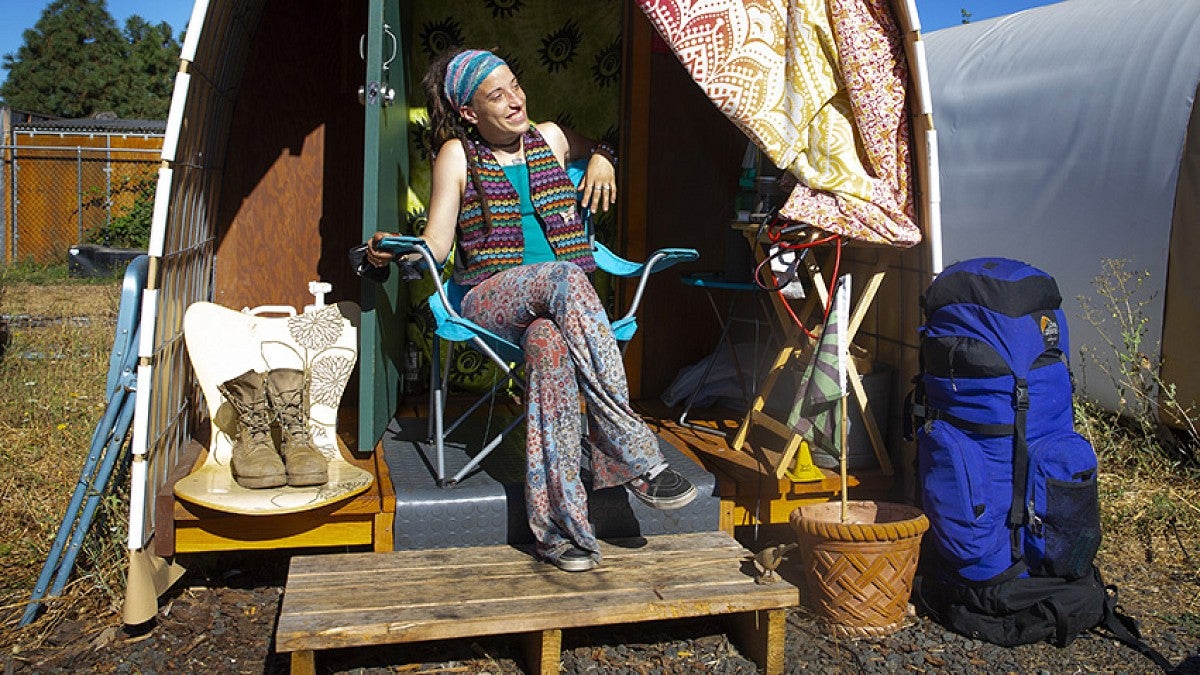Two recent School of Journalism and Communication graduates used an approach known as solutions journalism, a concept the school helped to develop, to uncover and report facts about the criminalization of homelessness.
Gina Scalpone and Zack Demars were involved in the Catalyst Journalism Project, a program combining investigative reporting with solutions journalism. Their stories focused on some of the most pressing and prevalent issues in Eugene: the criminalization of unhoused people and the community courts system cycle.
“This project informed me of the kind of reporting I want to do,” Scalpone said. “And that is on the criminalization of homelessness, causes of homelessness and solutions to homelessness. Because a lot of that information is out there, and we just act like it isn’t.”
Criminalization of homelessness refers to people being ticketed or arrested for crimes directly related to being homeless. That includes crimes like camping and public urination, which often occur because people do not have a place to care for daily human needs.
Nicole Dahmen, co-founder of the Catalyst Journalism Project with assistant professor Brent Walth, said the University of Oregon has gained a national reputation for being one of the country’s first universities to offer courses in solutions journalism. This national reputation caught the attention of the Howard Center for Investigative Reporting at the University of Maryland, which invited Catalyst to collaborate with them and several other universities on a yearlong project on homelessness.
“The Catalyst Project gave me a really good scope of how seven or eight different cities across the country are responding to homelessness,” Demars said. “So, I have a good base of knowledge to look at the city I’m in now.”
In community court, individuals can avoid conviction if they choose to perform community service and engage with services helping them find housing, a job and health care. The UO students explored whether community courts end reoccurring arrests.
Through their investigation, they found mixed results on whether community courts break the cycle of reoffending. More so, many courts aren’t asking questions about recidivism or keeping sufficient data, leaving their impact open to debate. Demars and Scalpone determined the court’s success depends on how well they are run and the nature of their programming.
“Journalism needs to give us a complete picture of the situation,” Dahmen said. “It has a responsibility to uncover and show problems. But we need to do more than that. We can’t just stop at the problem; the problem makes us feel hopeless, helpless, like there's nothing that we can do. Reporting on evidence-based responses gives audience members more efficacy and power to go out there and make a difference themselves, and also to hold elected leaders accountable.”
The Associated Press picked up the criminalization of homelessness story in June. In turn, it appeared in The New York Times, The Washington Post, PBS and various local news outlets. The community court story, which recent graduate Donny Morrison also worked on, ran on the front page of The Register-Guard on Sept. 5.
“By teaching our journalism students this combined approach, it leads to deeper, more quality reporting,” Dahmen said. “We are seeing our students get a lot of internships and jobs directly related to their experience with this approach.”
Both Scalpone and Demars said their experience with Catalyst made them want to continue to report on homelessness. Scalpone plans to stay in Eugene a bit longer, and Demars was recently hired as a general assignment news reporter at The World Link in Coos Bay.
Both were interns with the 2020 Charles Snowden Program for Excellence in Journalism, a donor-funded program at the UO that pairs journalism students with summer internships across the state.
“I think that Brent and Nicole are just fantastic, and they’re really the drivers of all this,” Demars said. “I cannot express enough how much I appreciate them and their hard work.”
Solutions journalism reports on big societal problems, such as economic disparity, racial injustice, climate change and, in this case, homelessness. Scalpone said Catalyst stories tend to provoke reactions from readers, and those reactions inspire people to go out and do something about issues facing their communities.
“We don’t think a lot about how solutions and investigative reporting connect, but really the best investigative reporting has some solutions element, and the best solutions reporting has some investigative bent,” Scalpone said. “It is important to the community, but it’s also just a really interesting read.”
—By Joanna Mann, School of Journalism and Communication


